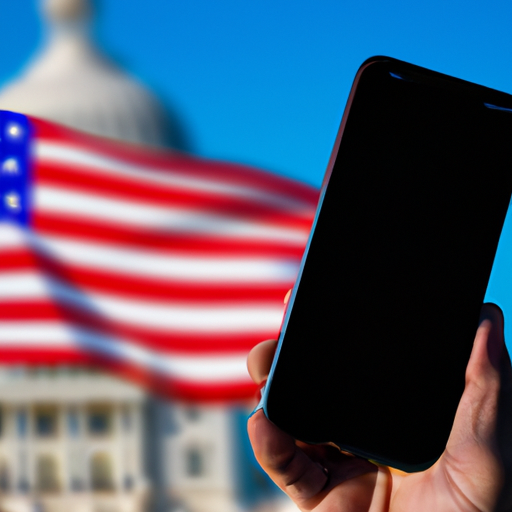In a recent turn of events, George Santos, the expelled New York Republican, has found a new way to make money: selling custom video messages on the Cameo app. This venture, unlike some of his previous financial pursuits, is perfectly legal and ethical, according to experts.
After being expelled from the House, Santos turned his talents to Cameo, an app that allows users to purchase personal videos made by public figures. Despite facing 23 charges for wire fraud, identity theft, money laundering, and other crimes, Santos claimed that he made more money on the app in one week than he did after nearly a year in Congress with a $174,000 salary.
Santos’ videos, currently priced at $500 each, have prompted a mixture of delight and mockery. Late-night host Jimmy Kimmel pranked Santos into recording several videos for his show, and Sen. John Fetterman (D-Pa.) purchased one to troll scandal-plagued Sen. Bob Menendez (D-N.J.).
Richard Painter, who served as chief White House ethics lawyer in the George W. Bush administration, stated that Santos has a First Amendment right to make whatever videos he wants. He added that the public is likely to take these videos in context, given Santos’ reputation and conduct.
Kathleen Clark, a professor of law who studies government ethics at Washington University in St. Louis, pointed out that Cameo customers know where their money is going, unlike those campaign donors who were unaware of Santos’ alleged fraudulent activities.
Santos isn’t the first politician who tried to profit off his troubles with the law. Former President Donald Trump has been selling NFTs since last December, and he recently announced that snippets of the suit he wore for his August mug shot would be available for purchase.
The New York Republican also isn’t the first former politician to make money off Cameo: Rudy Giuliani and Sarah Palin have both made videos on the app in recent years.
Richard Briffault, a professor of law who studies government ethics at Columbia Law School, suspects that users buy the videos based on Santos’ amusement value rather than his connection to the crimes he’s allegedly committed.
This case serves as a reminder of the importance of ethical conduct in our Constitutional Republic. It is crucial for voters to be aware of the actions and behaviors of their elected officials, both during and after their terms in office. As we continue to strive for fair and honest elections, let us not forget the role we play in holding our representatives accountable.
Source: Politico






The story of George Santos’ new venture on the Cameo app raises interesting questions about the intersection of personal branding and ethics. While it may be legal for him to sell custom video messages, it is worth considering the message it sends to the public. Are we comfortable with public figures profiting from their notoriety, especially when it stems from alleged criminal activities?
The story of George Santos’ foray into the world of personalized video messages on Cameo raises interesting questions about the public’s perception of individuals with controversial backgrounds. While some may find his videos entertaining, others may view it as a way for him to profit from his alleged wrongdoings. It’s a reminder of the complex relationship between fame, ethics, and public opinion.
The case of George Santos highlights the intersection of technology, politics, and ethics. The popularity of the Cameo app and the willingness of users to purchase videos from public figures like Santos raises questions about the public’s perception of politicians and their actions. It is a reminder of the importance of holding our elected officials accountable and being informed about their conduct both during and after their time in office.
The case of George Santos and his foray into selling custom video messages on Cameo raises interesting questions about the public’s perception of politicians and their ability to profit from their notoriety. While it may be legal and within Santos’ rights to engage in this business, it is important for voters to consider the ethical implications of such actions. Transparency and accountability are crucial in maintaining the trust of the public in our elected officials.
The emergence of politicians like George Santos using platforms like Cameo to make money after their political careers is a reflection of the changing landscape of media and technology. It also highlights the blurred lines between personal and public life. While Santos may have a First Amendment right to engage in this business, it is crucial for the public to critically evaluate the actions and conduct of their elected officials, both during and after their terms in office.
The story of George Santos’ foray into selling custom video messages on the Cameo app raises interesting ethical questions. While it may be legal and within his rights, it is important to consider the reputation and conduct of the individual involved. The public’s awareness and scrutiny of their elected officials’ actions and behaviors are crucial for maintaining a healthy democracy.
The story of George Santos’ venture into selling custom video messages on the Cameo app is certainly intriguing. It raises questions about the intersection of personal branding, ethics, and the First Amendment. While Santos may have a right to make these videos, it is important for the public to consider the context and reputation of the individual involved. This case serves as a reminder of the need for transparency and accountability in our political system.
The story of George Santos’ new venture on the Cameo app is certainly intriguing. It raises questions about the boundaries of ethical conduct for public figures. While Santos may have a First Amendment right to make these videos, it is important for the public to consider the context and reputation of the individual involved. This case serves as a reminder of the need for transparency and accountability in our elected officials.
The emergence of platforms like Cameo has created new opportunities for public figures to monetize their personal brand. However, it also raises concerns about the potential for exploitation and the blurring of ethical boundaries. It’s important for consumers to be aware of the context and background of the individuals they choose to support through these platforms.
The story of George Santos’ venture into selling custom video messages on the Cameo app raises interesting questions about the intersection of ethics and personal profit. While it may be legal for Santos to engage in this business, it does raise concerns about the message it sends to the public. It is important for voters to be aware of the actions and behaviors of their elected officials, as it reflects on the integrity of our democratic system.
It’s fascinating to see how public figures like George Santos are adapting to the digital age to monetize their fame or infamy. The Cameo app provides a platform for them to directly engage with their audience and capitalize on their notoriety. However, it also raises questions about the boundaries between personal and professional ethics, and the impact it may have on public perception.
I appreciate your thoughtful comment. Indeed, the case of George Santos does raise questions about the ethical implications of politicians profiting from their notoriety. As you rightly pointed out, transparency and accountability are key in maintaining public trust. It’s important for voters to stay informed and hold their representatives accountable for their actions, both during and after their terms in office.
The story of George Santos’ venture into selling custom video messages on the Cameo app raises interesting questions about the intersection of ethics and personal profit. While it may be legal for Santos to engage in this business, it does raise concerns about the message it sends to the public. It is important for voters to be aware of the actions and behaviors of their elected officials, as it reflects on the integrity of our democratic system.
The case of George Santos and his foray into selling custom video messages on Cameo raises interesting questions about the public’s perception of politicians and their ability to profit from their notoriety. While it may be legal and within Santos’ rights to engage in this business, it is important for voters to consider the ethical implications of such actions. Transparency and accountability are crucial in maintaining the trust of the public in our elected officials.
The emergence of politicians like George Santos using platforms like Cameo to make money after leaving office highlights the evolving landscape of political engagement and monetization. It is intriguing to see how public figures are finding new avenues to connect with their audience and capitalize on their fame. However, it also raises questions about the ethical implications and the public’s perception of such activities.
The story of George Santos’ venture into selling custom video messages on the Cameo app is certainly intriguing. It raises questions about the intersection of personal branding, ethics, and the First Amendment. While Santos may have a right to make these videos, it is important for the public to consider the context and reputation of the individual involved. This case serves as a reminder of the need for transparency and accountability in our political system.
The case of George Santos and his foray into selling custom video messages on Cameo raises interesting questions about the public’s perception of politicians and their ability to profit from their notoriety. While it may be legal and within Santos’ rights to engage in this business, it is important for voters to consider the ethical implications of such actions. Transparency and accountability are crucial in maintaining the trust of the public in our elected officials.
While I agree that consumers should be aware of who they’re supporting, I think it’s also important to remember that these platforms are often used for entertainment purposes. People buying Santos’ videos are likely doing so for amusement, not because they support his past actions. It’s a complex issue, but I don’t think it’s fair to label it as exploitation.
The case of George Santos and his foray into selling custom video messages on Cameo underscores the importance of transparency and accountability in our political system. While Santos may have a First Amendment right to engage in this business, it is crucial for voters to be informed about the actions and conduct of their elected officials. This story serves as a reminder of the need for ethical conduct and the role citizens play in holding their representatives accountable.
It’s fascinating to see how politicians like George Santos are finding alternative ways to make money after leaving office. The popularity of the Cameo app and the demand for personalized videos from public figures seem to be driving this trend. However, it is crucial for voters to remain vigilant and informed about the actions and behaviors of their elected officials, both during and after their terms in office.
The emergence of politicians like George Santos using platforms like Cameo to make money after their political careers is a reflection of the changing landscape of media and technology. It also highlights the blurred lines between personal and public life. While Santos may have a First Amendment right to engage in this business, it is crucial for the public to critically evaluate the actions and conduct of their elected officials, both during and after their terms in office.
I agree with your point about the complexities of free speech and the right to profit from one’s image. However, I believe it’s also important to remember that consumers have the power to choose who they support. If Santos’ past actions are questionable, it’s up to the individual to decide whether they want to contribute to his earnings or not.
The case of George Santos and his foray into selling custom video messages on Cameo raises interesting questions about the public’s perception of politicians and their ability to profit from their notoriety. While it may be legal and within Santos’ rights to engage in this business, it is important for voters to consider the ethical implications of such actions. Transparency and accountability are crucial in maintaining the trust of the public in our elected officials.
You’ve hit the nail on the head. The demand for Santos’ videos indeed highlights the complexities of human behavior and public opinion. It’s fascinating how some consumers can separate his personal life from his entertainment value. This case certainly underscores the power of personal branding and the influence it can have, regardless of one’s past actions.
The story of George Santos’ venture into selling custom video messages on the Cameo app raises interesting questions about the intersection of ethics and personal profit. While it may be legal for Santos to engage in this business, it does raise concerns about the message it sends to the public. It is important for voters to be aware of the actions and behaviors of their elected officials, as it reflects on the integrity of our democratic system.
The case of George Santos highlights the challenges of reconciling personal freedom with public accountability. While he may have a First Amendment right to make videos on Cameo, it raises questions about the responsibility of public figures to uphold ethical standards. It also underscores the importance of informed consumer choices and the need for transparency in the digital marketplace.
I appreciate your thoughtful comment. Indeed, the story of George Santos does raise questions about personal branding, ethics, and the First Amendment. It’s a complex issue that requires careful consideration. As you rightly pointed out, transparency and accountability are key in our political system. This case serves as a reminder of the importance of these values.
The story of George Santos’ venture into selling custom video messages on the Cameo app is certainly intriguing. It raises questions about the intersection of personal branding, ethics, and the First Amendment. While Santos may have a right to make these videos, it is important for the public to consider the context and reputation of the individual involved. This case serves as a reminder of the need for transparency and accountability in our political system.
The story of George Santos’ venture into selling custom video messages on the Cameo app raises interesting questions about the intersection of ethics and personal profit. While it may be legal for Santos to engage in this business, it does raise concerns about the message it sends to the public. It is important for voters to be aware of the actions and behaviors of their elected officials, as it reflects on the integrity of our democratic system.
The story of George Santos’ venture into selling custom video messages on the Cameo app raises interesting questions about the intersection of ethics and personal profit. While it may be legal for Santos to engage in this business, it does raise concerns about the message it sends to the public. It is important for voters to be aware of the actions and behaviors of their elected officials, as it reflects on the integrity of our democratic system.
I appreciate your thoughtful comment. It’s indeed a complex issue. While Santos’ actions are legal, the ethical implications are certainly worth discussing. The public’s comfort level with such practices is subjective and varies. However, it’s crucial to remember that consumers have the power to decide whether or not to support such ventures. This situation underscores the importance of public awareness and accountability in our society.
The story of George Santos’ success on the Cameo app raises interesting questions about the power of personal branding and the influence of public perception. Despite his alleged criminal activities, there seems to be a demand for his videos, suggesting that some consumers are willing to separate his personal life from his entertainment value. It’s a reminder of the complexities of human behavior and the subjective nature of public opinion.
Absolutely, the power of personal branding is undeniable. It’s intriguing to see how Santos’ notoriety has actually boosted his appeal on Cameo. It’s a stark reminder that in today’s society, any publicity can be good publicity, even if it stems from criminal charges. It’s a complex dynamic that certainly warrants further exploration.
The emergence of politicians like George Santos using platforms like Cameo to make money after their political careers is a reflection of the changing landscape of media and technology. It also highlights the blurred lines between personal and public life. While Santos may have a First Amendment right to engage in this business, it is crucial for the public to critically evaluate the actions and conduct of their elected officials, both during and after their terms in office.
The case of George Santos highlights the complexities of free speech and the right to profit from one’s own image and reputation. While some may find his videos amusing, others may question the ethics of supporting someone with a questionable background. It’s a reminder that our choices as consumers can have broader implications beyond mere entertainment value.
The emergence of politicians like George Santos using platforms like Cameo to make money after their political careers is a reflection of the changing landscape of media and technology. It also highlights the blurred lines between personal and public life. While Santos may have a First Amendment right to engage in this business, it is crucial for the public to critically evaluate the actions and conduct of their elected officials, both during and after their terms in office.
While I agree that public figures should uphold ethical standards, it’s important to remember that Santos is no longer a public official. His actions on Cameo are as a private citizen. As consumers, we have the power to choose whether or not to support him. Transparency is key, and in this case, it seems to be present.
I agree with your point about consumer power and transparency. However, it’s also important to remember that even as a private citizen, Santos’ actions can still influence public opinion and potentially impact future political endeavors. Ethical conduct shouldn’t just be a requirement for public office, but a standard for all citizens.
I agree with your point about the importance of transparency and accountability. However, I think it’s also worth noting that Santos’ actions on Cameo are a far cry from his alleged fraudulent activities. At least here, customers know where their money is going and are willingly participating in the transaction. It’s a strange situation, but not necessarily an unethical one.